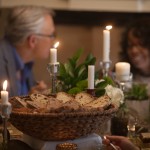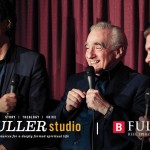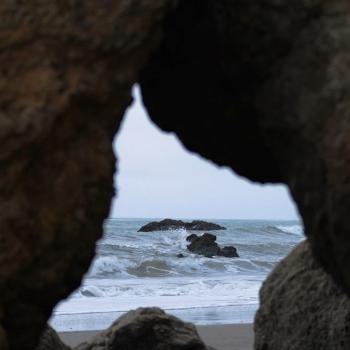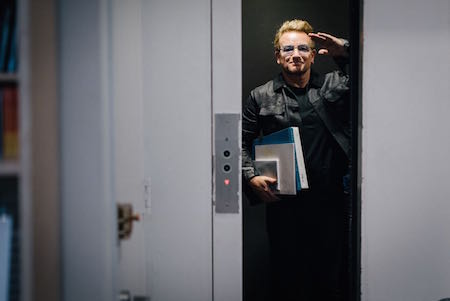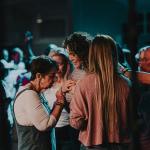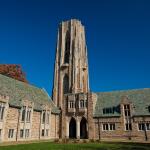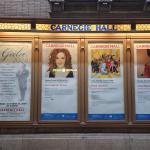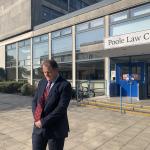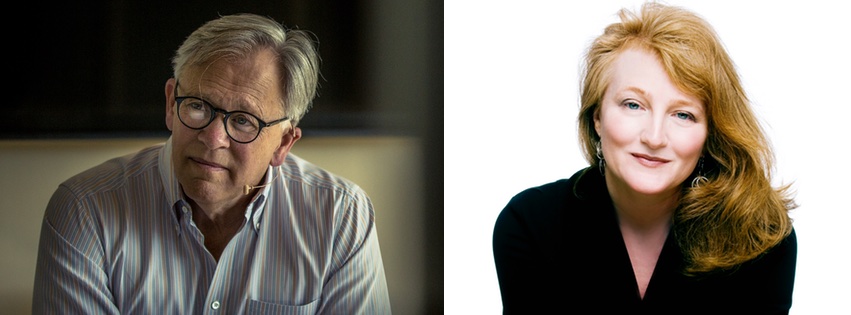
Krista Tippett, founder and host of public radio’s program On Being, reflects with Dr. Labberton on the role of wisdom in shaping public discourse for Conversing, a new FULLER studio podcast. This transcript has been edited for length and clarity, and you can listen to the rest of interview—as well as other episodes—here.
Mark Labberton: We welcome to our conversation today Krista Tippett. Tippett is a Peabody award winner for her wide ranging and thoughtful program On Being, that can be found on hundreds of national public radio stations around the country. She is also a National Humanities Medalist given by the White House, in honor and acknowledgement of her thoughtfully delving into the mysteries of human existence. She presents a brave and fiercely hopeful vision of humanity for this century, and she’s an expert in open and generous conversation. She does so with a quite remarkable spectrum of people and perspectives—scientists, theologians, poets, and activists. So it’s a great joy to welcome Krista Tippett to this conversation.
Krista Tippett: So glad to be with you.
Mark: Krista, I was immediately taken by the title of your recent book, Becoming Wise: An Inquiry into the Mystery and Art of Living. As the president of a theological seminary, there’s probably no single topic that gathers up the themes of our whole enterprise as much as the simple word “wisdom,” and yet it’s not one that gets talked about much. I think it’s fluent for you, as your book marvelously demonstrates, but it’s not fluent in our culture. So let’s begin by talking about the book. It’s no surprise to listeners of your program that you would choose a theme like wisdom; in some ways this is a gathering up of your program as well. I’m curious if you could give us a little more of the history of how that word and that theme emerged for you in your program and then eventually into this book.
Krista: Interestingly, I did not name the book until I was almost done, and what I originally was pursuing was a question that people have asked me across the years: what are the recurring themes, the common denominators of these wise and graceful lives that we engage? It was only near the very end that the book needed a name. I realized as I looked through it that “Becoming Wise” was the name. There was no question that the phrase crystallized what I was naming and tracing, and I think it was important to name wisdom. It’s not a word we use much, and maybe that’s good because it’s not ruined like a lot of the other good words we use. I had been working with this language of Einstein. He said there’s such a thing as a “spiritual genius” that the world needs just as much as we need purveyors of objective knowledge. I think that the language of spiritual genius, or calling someone a saint or even calling someone wise in public, often puts them up on a pedestal. What was so important to me, the deeper I delved into my gleanings from these years of conversation, is that there are wise people we can point at, that we can talk about the qualities of those lives, and that wisdom emerges through the raw materials of life—my life, your life, and any life.
Mark: I’m interested in this verb before “wise”: becoming wise, as opposed to getting wise or achieving wisdom or winning wisdom or something else. It’s clearly a process and one that’s ancient in its history. I’m wondering if you could say a bit more about that. What you say in the book about elements of your own spiritual, intellectual, philosophical journey ties in very much with wisdom. How does it intersect with your own narrative and your quest?
Krista: Well, the word “becoming” is as important as the word “wise,” and it is a process. It’s not a destination, and it’s never finished. I don’t think I could trust someone who would say they’re a mystic or a saint or wise. There’s something elusive about the quality of possessing this thing, and living faithfully is understanding that you don’t possess it. You don’t claim it; it’s never finished. Wisdom has potential to emerge and evolve in every moment, in every action, and in every relationship.
![]() Conversing: A Podcast Series with Mark Labberton
Conversing: A Podcast Series with Mark Labberton
A whirlwind occurs at the intersection of two weather masses of differing temperature and direction that spin into a brief but powerful force. This icon is inspired by a painting by Fuller Seminary President Mark Labberton that hangs in his office, and is meant to evoke both the power of conversation and the turbulence of our times. As ambassador of Fuller, Labberton takes the occasion of his travels to speak with a broad spectrum of leaders on issues at the intersection of theology and culture. Subscribe to the Conversing podcast on iTunes.
Mark: Without claiming to know more of your story than your book suggests, it feels as though it’s been a journey about wisdom that gathers up a lot of the themes of your own intellectual and spiritual story. Is that true? I’m not asking if you yourself claim to be wise—but does the pursuit of becoming wise gather up themes in your own spiritual journey, and if so what have been some of the significant turning points?
Krista: I don’t think I’ve ever been asked the question in quite that way or that I’ve asked myself the question quite that way—which means it’s a great question! But I’m very comfortable using that language as a container for what I want to be and what I want to become. At this point, I have a lot of teachers and role models, and it’s good language within which to gather these virtues and vocabularies and practices—that’s kind of what I collect. I think we need all the richness of that diverse vocabulary, and those different practices, to get anywhere near what it is we’re trying to see clearly. I think somehow that word “wisdom” and that pursuit of “becoming wise” is spacious enough and grounded enough for all of that.
Mark: It’s really a kind of capacious phrase. It has such a breadth and depth to it, and it’s very invitational. I love that at the beginning of the book you make this comment describing yourself: “I’m a person who listens for a living. I listen for wisdom and beauty and for voices not shouting to be heard. This book chronicles some of what I’ve learned in what has become conversation across time and generations, across disciplines and denominations.” I think that’s not only a wonderful beginning to a book, but it’s a distillation of what the whole rest of the book actually does unpack and exemplify in various ways. Why do you think wisdom as a piece of contemporary vocabulary is particularly so uncommon?
Krista: I don’t know why it’s uncommon. I’ve realized as I’ve been out talking about it that there’s this association of “wise” and “old” as though it’s something generational. And yet you can ask anyone about the wise people in their life, and immediately faces and lives come to mind of all ages. I think one reason it’s so magnetic is that it’s different from something like intelligence, which can be a possession. Intelligence is something you possess, but I think wisdom is recognizable and measured—it’s interactive. You don’t just say “He or she is a wise person,” but you know them by the effect they have on the world and on those around them. In this generation (both demographically but also those of us living now in this evolutionary moment), there is this new longing to connect what you believe and who you are, this language of integrity and authenticity and transparency that has been introduced into our vocabulary as a reflection of that longing. And wisdom does that—it embodies these things we now are recognizing as so essential if we want to be whole.
Mark: I often think of wisdom like a series of sinews that tie flesh and soul and body and mind together in that way that you’re describing. It’s an integrative word. It’s never an isolated autonomous word or experience. It’s always about convergence and communion and connectedness and participation and vision—all those things in some way or another are brought together. You write a bit about your own Christian background and elements of your journey that come back to some sort of association with that. How would you say a search for wisdom has been related to your encounters with the Christian faith?
Krista: That’s another good question. I talk a lot about my Southern Baptist preacher grandfather, and I think I would call my grandfather one of the first wise people in my life. But there was a disconnect between his magnanimous, generous, and passionate qualities with his faith. He didn’t quite know how to connect those qualities of himself with what he knew of Scripture or theology. He hadn’t been invited to do that, and I think he was fearful of what might happen if he did—I think the prospect terrified him! It didn’t feel possible, and in some ways I think that is part of my experience of Christianity as well. It’s a disconnect that was somehow tolerable because Christianity was inherited in people’s lives and inherited in culture. There was leadership, there was authority to it that was given. That’s not true anymore, and it’s not inherited. So I think that disconnect becomes intolerable, and that’s a good thing. I think ultimately that’s a good thing for Christianity and for the church.
Mark: What’s interesting in the biblical roots for wisdom is that it’s a comprehensive word that ultimately is a reflection of the character and life of God. So it’s interesting, as my father used to often point out, that what religious people are often prone to do is take great things and make them small. When it comes to an issue like wisdom, this feels like it’s an example. This wisdom that I think the Hebrew scriptures and the New Testament talk about is this very deep, profound, integrated reality that’s nothing less than the full character and goodness and love of God, but it’s reduced to something very small: aphorisms, legalisms, declarations of boundaries. I think your grandfather’s story is an example of how that small-making can happen at times. Then it seems as though a Christian point of view has no evidences of wisdom, which is a very common indictment.
Krista: Yes, and I would say that the wisdom traditions in Scripture are not something I was very aware of at all growing up, or even really the prophetic tradition in its fullness. And yet this is what the 21st century is longing for, wants to know about, needs—whether they are religious or not. That’s the tragedy but also the potential of this moment.
Listen to the full interview on FULLER studio, Fuller Seminary’s resources for a deeply formed spiritual life. Learn more about Fuller Seminary here.

